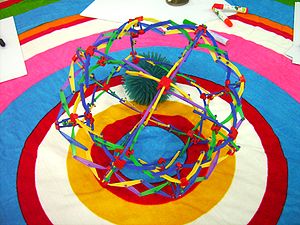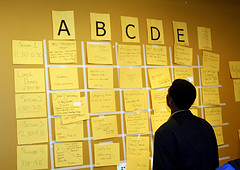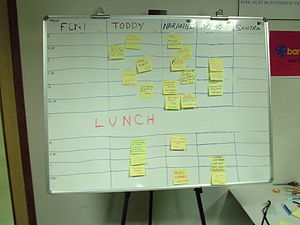At #CLS09 we had a bunch of discussions and talks about unconferences and things related to them. To the ones that are new to this space – unconference is essentially a conference where the talks are given by the participants. BarCamp is a brand of general conference, mostly in geek space, that is done in unconference fashion. The history is richer than that, but you can read more about it in the wiki.
When I first started talking about BarCampLjubljana last year, it was mostly out of frustration that we don’t have barcamps. The us too wish and the general frustration with the perceived lack of geeks in the area. So began the process of education enough people about unconference style of event and finding people that helped organize the event as well as participants. I feel that this process was valuable in so far to teach the community about these types of tools and ways of interacting.
The real problem with this approach was that we focused too much on the tools and the process and not enough on the main thing – the content and the topic itself. Just like we can talk all the time about the development tools and programming languages that we use instead of the things that we’re actually building with them.
This showed in the pitch for BarCampLjubljana 1 and 2 – “lets meet and talk about whatever. Show us your recent work and the things that matter to you”. To make the things even worse, we didn’t think too much about who we invited as we basically distributed the message across a few of our usual channels: blogs, Facebook, Twitter and limited mailing lists and forums.
Looking at it now, the result was exactly what you would expect: about 100 of our friends gathered, they talked about their current projects and obsessions and they’ve got to know each other. It was interesting to listen about new projects, but there was only that much that kept community together. Lucky for us, the friends that we invited were fellow geeks from within the industry so there was enough of common ground that they understood each other and could talk to between themselves.
The second BarCampLjubljana presented this in clearer fashion – the talks had even less things in common, as the audience was largely the same, there was not much development in the 3 month period and the general feeling that something was missing was in the air. Everyone still had a great time, but we didn’t the fulfill the promise of BarCamps that we were supposedly bringing – pure and epic awesomeness unconferences.
So what now?
As we’ve learned how to do an unconference, I would propose that we let go of BarCamp’s all together and instead focus on topical unconferences. Instead of trying to force all topics on everybody we should start focusing on different topics and communities around them.
While Slovenia is small, different communities are still large enough that they can sustain an event or two on a yearly basis.
Instead of having BarCampLjubljana3, lets call it what we really want it to be – WebCamp. Lets not be afraid to talk hard-core tech stuff, with a bit of workflow and personal ranting about the industry mixed in. There is a whole range of topics from amateur sports to personal development that could benefit from such unconference.
While doing these events, we need to take into account a few things:
Smaller can be better. Thirty engaged individuals can benefit much more from each other than 300+ crowd. There is enough space in event space for both types of events.
Lets not be afraid of small communities. While we might know everyone in our field, we often don’t take time to actually talk to each other. Lets create opportunities to do this and we might discover a few new peers in the process.
Experiment with new things. Unconference is still a very abstract idea and lets see how different groups of people shape it.
We should build support framework for unconference style events, while still keeping it open and vague enough that the community has to make their own flavor.
Conclusion
So what’s left for BarCamp then? I see three possible ways that it can take shape:
- As a meta unconference of hard-core unconference visitors. Just so that we don’t have ‘unconference about unconference’.
- An unconference of thinkers and doers from different fields that want to see alternative view from different fields. We would probably still need a theme.
- It will go away. Topical unconferences will provide enough information exchange.
As always, open discussion on this topic is encouraged so let me know how you feel about these ideas, either in comments or in one of the gazillion other places (blogs, twitter, etc.)



![Reblog this post [with Zemanta]](http://img.zemanta.com/reblog_e.png?x-id=3e7e80fc-bd3e-4524-aaa2-5afb6d75fc90)
as long as people dedicate their energy and time in a positive fashion, all is goodness.
I like the idea of topical conferences. As much as I loved barcamp2 (didn't go to the first one) I somehow missed non tech topics and I'm hard core geek myself.
The problem is probably also that people aren't used to mix different things or topics, so the *conferences are usually topical.
I loved the BCLJ2 (I wasn't on 1) and would love BCLJ3 but I agree with what you say. Make it topical but not to tight either or it will be just another wwwh Wednesday .
The idea of a common theme is good. I think, however, that for that to be a profitable day the attendands need to share in advance the micro topics they want to present. Maybe a wiki can help. This will avoid the risk of presentations covering the same micro topic and not addressing something important.